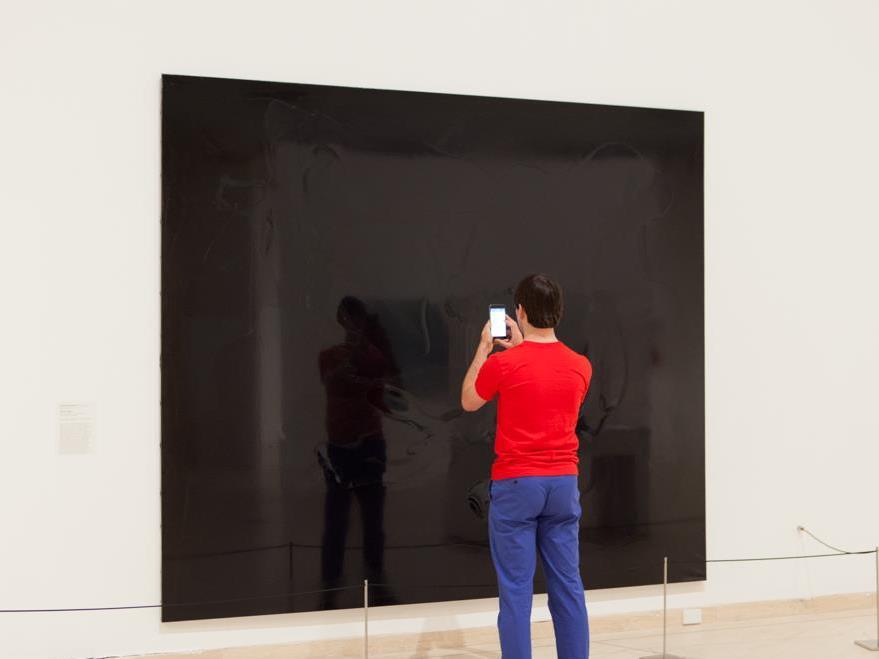Proximity is a festival of one-on-one performance pieces that very much implicate the audience in its exploits. Arriving ticket holders are given a map and a wristband, asked to participate in a meditation involving fish and tea and cucumbers on their eyes, then then released, alone, into the care of the artists.
Featuring several program streams, the festival has no permanent home. Previous venues have included PICA and the Fremantle Arts Centre, but this year Proximity has found itself in the galleries of the Art Gallery of WA (AGWA). It also takes place during the day, and steeps contemporary performance art in very traditional environments while placid gallery visitors occasionally watch on.
(If you are one of the few to still have tickets to the sold out festival over the next couple of days, probably stop reading here. Spoilers ahead.)
The artists who engage directly with the artworks around them tend to do it with cheek. Current Mood in Program A sees Jackson Eaton uses Snap Chat to desecrate classic artworks and then laugh about it, demonstrating an incompatibility between their art form and his, finally admitting to the stupidity of the latter. It’s an intentionally self-conscious piece, uncomfortable, with a touch of irritating ironic arrogance.
Also in Program A is Malcolm Whittaker’s Once of Twice Daily, a very conversational piece that involves criticising the surrounding art and then becoming art yourself – on a plinth and everything. It’s a tangled, playful, quick-thinking performance, that engages freshly in the tired argument of “What is art, what is art for?”, before smashing comfort zones around intimacy with strangers – though this last part is perhaps conducted a little too carefully.
Monopoly by Chloe Flockart challenges its audience to consider their own morality, again using discomfort as food for thought, with an immensely clever defence mechanism if things get unsafe. And in Sex Talk, with Mish Grigor, the audience is asked to join the artist in her crude but complex attempt at figuring out familial relationships and ethics. Like the rest of Program A, the audience is asked to join with the artist to figure out small and large complexities of the world, the experience leaving us with churning brains and, after Whittaker’s piece, fresh breath.
Program B is more outward facing in its introspection. Beings-Unlike-Us by Caroline Garcia is a sad, perhaps blatant, car wreck of Philippine traditional culture and the insidious consumer culture that corrupts it. It’s made all the sadder and more cutting by Garcia’s practiced indifference. Set in the foyer of the gallery, the audience is made complicit as gallery visitors look on.
Micronational by Tom Blake is fun but a little undercooked. Audience members make and name their own internet Micronation, with the URL written on their arm as they stand on a platform, facing the wall, next to their flag. In the consultation beforehand, they are asked questions about their ‘state’, Blake toying with homonyms in a way that doesn’t quite gel or develop. In Meditations on Water, Mei Saraswati reminds us that Perth was once a lake; that under all this concrete the natural world still occasionally sends up leaks for us to pump away. Hers is a beautiful and comprehensive piece, that utilizes our more marginalised senses to connect with what’s been lost.
After is probably the strongest, most terrifying of all the pieces. For me it was the stand out of the festival. In it, the audience member is made entirely vulnerable, laid out face down on a massage table while Phillip Adams, completely naked, moves slowly around them. The audience cannot see him, they can only catch glimpses in a series of mirrors laid out below them. It is a terribly threatening, viscerally scary, and stunningly beautiful piece that uses the form of Proximity to its fullest to shoulder hard into personal boundaries.
Program C engages with space, detail, the unknown, and seems the more unconnected of the programs. Brett Smith combines the might of a grand piano with the acoustics of some forgotten staircase in the bowels of the gallery, to great effect. When You’re Here, I’m Nowhere is a beautiful, dramatic explosion of emotion and music. It’s up to the audience to decide what it’s all about, while they’re soaked, heart to skin, in incredible sound. Leon Ewing does something similar with Raised by Brutalism, only with bass and the hard, repeating lines of a surprisingly striking concrete stairwell elsewhere in the building. Audience members may not take the interstitial blandness of a stairwell for granted again, but the piece was overly long, and could have used another, more interactional element.
Dead Line is something completely different. Jo Bannon is curious about her own death and wants to talk about it. Alone with a big red phone, facing a full wall of windows, audience members have a candid conversation with Bannon about this most confronting of subjects. While the experience may have a strong impact depending on audience experience and opinion, there’s something self-indulgent about the piece, both for audience and performer. Emily Parsons-Lord’s piece is more whimsical and, also, pretty cool. In a program of pieces that encourage you to engage with your emotions and and retreat into your own head, the act of finding stars and burning coloured potassium in You Will Always be Wanted by Me is refreshingly playful, fun and irreverent.
This year, the Proximity Festival is stronger than ever. There was still a timidness to some of the pieces, but it’s undercut by a deft curatorial hand, just out of view. The performances, as well as the structure of the festival, are executed with a sure and playful confidence. This year, the Proximity Festival turns four, and its maturity – blatantly demonstrated in venue – is palpable.
Proximity Festival 2015
Curated by Sarah Rowbottam and Kelli Mccluskey
Co-presented by the Art Gallery of Western Australia
proximityfestival.com
28 October – 8 November





